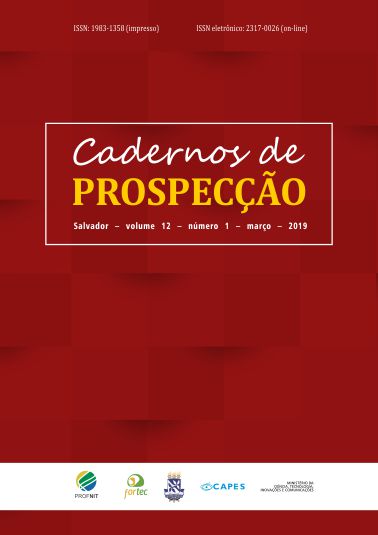Entrepreneurship Teaching Methods Comparaison for Children and Teenagers in Brazil
DOI:
https://doi.org/10.9771/cp.v12i1.27060Keywords:
Tecnologia, Inovação, Prospecção, Informação Tecnológica, Patente, Propriedade Intelectual, Invenção, Marcas.Abstract
The paper was developed using a bibliographical research to make a comparative analysis of proposals and methodologies of entrepreneurship teaching in Brazil. The study analyzes four cases of teaching for children and teenagers and makes an analysis of the teaching proposals of entrepreneurship for vulnerable children and teenagers. Models, scholars and referenced institutions were searched for a significant sample and the information was evaluated based on the American authors classification method of Babson College. The objective of analyzing which proposals could be used in the teaching of entrepreneurship for children and young people in situations of vulnerability did not give satisfactory result. The result shows that the Sebrae proposal is the best, but it does not have a focus focused on this needy population.
Downloads
References
ALMEIDA, M.; BIANCONCINI, E. Apresentação. In: BACICH, L.; MORAN, J. (Comp.). Metodologias ativas para uma educação inovadora. Porto Alegre: Penso, 2018. Cap. 1. p. 5-13. (Desafios da Educação).
AVENI, A. Empreendedorismo Contemporâneo: teorias e tipologia. Brasília: Atlas, 2014. 198 p.
DOLABELA, F. Oficina do Empreendedor. Rio de Janeiro: Sextante, 2008. 316 p.
DOLABELA, F. Pedagogia empreendedora. São Paulo: Cultura, 2003. 1 v.
DORNELAS, J. Empreendedorismo: Transformando Ideias em negócios. 5. ed. Rio de Janeiro: LTC, 2014. 267 p.
DORNELAS, J. Fazendo Acontecer: Poderes Empreendedores. São Paulo: Empreende, 2016a. 1 v.
DORNELAS, J. Fazendo Acontecer: oficinas lúdicas de empreendedorismo para crianças e adolescentes. São Paulo: Empreende, 2016b. 1 v.
FILION, L. J.; LAFERTÉ, S.. Um roteiro para desenvolver o empreendedorismo. Tradução de Fillion e Lafetté. Carte routière pour un Québec entrepreneurial. Chaire d’ entrepreneuriat Rogers – J.A.Bombardier. Raport remis au Gouvermement du Québec. HEC Montréal, 2003.
GLOBAL ENTREPRENEURSHIP MONITOR (GEM). Empreendedorismo no Brasil. Relatório global, 2016. Disponível em: <http://www.sebrae.com.br/Sebrae/Portal%20Sebrae/Anexos/GEM%20Nacional%20-%20web.pdf>. Acesso em: 20 abr. 2018.
KIRBY, David. Entrepreneurship education: can business schools meet the challenge? Education + Training, [S.l.], v. 46, n. 8/9, p. 510-519, 2004.
LIBÂNEO, J. C. Didática. 4. ed. São Paulo: Cortez Editora, 1994. 263 p. (Formação do Professor).
McCLELLAND, D. C. A sociedade competitiva: realização e progresso social. Rio de Janeiro: Expressão e Cultura, 1972.
NECK, H. M.; GREENE, P. G.; BRUSH, C. G. Teaching Entrepreneurship: a Practice-Based Approach. Cheltenham: Edward Elgar Publishing, 2014. 352 p.
READY, D. A.; CONGER, J. A.; HILL, L. A. Are You a High Potential? 2010. Disponível em: <https://hbr.org/2010/06/are-you-a-high-potential>. Acesso em: 1º jun. 2010.
SERVIÇO BRASILEIRO DE APOIO ÀS MICRO E PEQUENAS EMPRESAS (SEBRAE). Programa Nacional da Educação Empreendedora (PNEE). 6 de março de 2018. Disponível em: < http://www.sebrae.com.br/sites/PortalSebrae/Programas/programa-nacional-da-educacao-empreendedora-pnee,2c7cd24a8321c510VgnVCM1000004c00210aRCRD>. Acesso em: 5 out. 2018.
Downloads
Published
How to Cite
Issue
Section
License
Copyright (c) 2019 Cadernos de Prospecção

This work is licensed under a Creative Commons Attribution-NonCommercial 4.0 International License.
O autor declara que: - Todos os autores foram nomeados. - Está submetendo o manuscrito com o consentimento dos outros autores. - Caso o trabalho submetido tiver sido contratado por algum empregador, tem o consentimento do referido empregador. - Os autores estão cientes de que é condição de publicação que os manuscritos submetidos a esta revista não tenham sido publicados anteriormente e não sejam submetidos ou publicados simultaneamente em outro periódico sem prévia autorização do Conselho Editorial. - Os autores concordam que o seu artigo ou parte dele possa ser distribuído e/ou reproduzido por qualquer forma, incluindo traduções, desde que sejam citados de modo completo esta revista e os autores do manuscrito. - Revista Cadernos de Prospecção está licenciado com uma Licença Creative Commons Attribution 4.0. Esta licença permite que outros remixem, adaptem e criem a partir do seu trabalho para fins não comerciais, e embora os novos trabalhos tenham de lhe atribuir o devido crédito e não possam ser usados para fins comerciais, os usuários não têm de licenciar esses trabalhos derivados sob os mesmos termos.
Este obra está licenciado com uma Licença Creative Commons Atribuição 4.0 Internacional.





